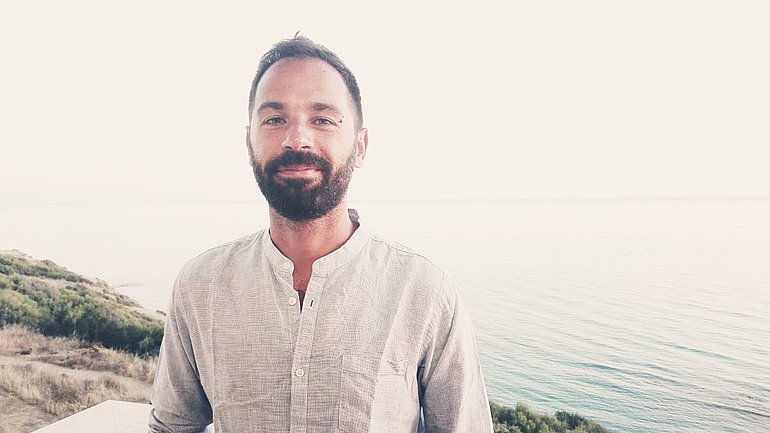"The identity of Russian speakers in Ukraine was subject of social and political appropriation"
The sense of belonging of Russian speakers in Ukraine has been cause for much speculation in the media during the past years of the Ukraine crisis. In his latest publication “Ukrainian, Russophone and the Other Russian”, political scientist Marco Puleri analyses this phenomenon and shares his findings in a ZOiS interview.

Your book is titled “Ukrainian, Russophone and the (Other) Russian”. What is the “other Russian”?
Through the political and cultural debates in Ukraine and Russia, it became quite clear that the identity of Russian speakers in Ukraine was subject of social and political appropriation. My idea for the book was to deconstruct the binary opposition of Ukrainian and Russian speakers. I did not want to portray Ukraine as a “divided” country. The Ukrainian crisis is really a process that started at the end of the Soviet Union in 1991. Russian speakers in various countries found themselves searching for new cultural and ideological affiliations. They represent the “Other Russian”. This term comes with a model of self-identification, which is based on a complex array of different backgrounds that cannot be appropriated – neither by the Russian Federation nor by the Ukrainian state or political discourse.
In the introduction, we learn that the term “Russophonia” has a difficult genesis. Could you tell us more about its development and history?
Nowadays, we face challenges to understand how Russian culture produced outside of the Russian federation differs from Russian culture produced inside the Russian federation. For example, we witnessed Vladimir Putin legitimising his political moves in Donbas and Crimea by the excuse of defending the “Russians” who live in these areas. Russophonia is a concept, which tries to understand Russian culture as a complex field made by different actors who work and live in different geographical areas, creating various distributions to Russian culture. Like Russian-speaking authors, who publish in Ukraine but contribute to the Russian culture through their language.
Large sections of the book use the lens of the postcolonial theory, which was created for critical dealing with Europe’s and America’s colonial history. Could you elaborate on the attempt to use the postcolonial theory in regard to the history of the post-Soviet states?
After the collapse of the Soviet Union, there was a long and very harsh debate among historians, sociologists and literature critics regarding the question, if it was possible to adapt the postcolonial methodology to the realm of the post-Soviet space. The problem is that Russia in this context is not comparable with the European colonialists of the pre-modern times. While one could describe the Ukrainian people as victims of the Soviet Union’s cultural policies, they were at the same time an active part of the Soviet establishment. Therefore, while we should not simply copy the approach, we can work with specific tools from the postcolonial theory. That is, why I chose to analyse the phenomenon of hybridity. Focusing on this aspect overcomes the strict binarism between Russian and Ukrainian culture.
One of the central topics of your book concerns the relationship between literature and language. After the 2014 revolution, we witnessed a stronger shift to the Ukrainian language in the country. Would you say this also changed the character of literature?
The Ukrainian language always had a special value for the construction of national identity. During the Cold War, it became a symbol of Ukrainian dissidence, but there has not been a real “shift” in language, although more people identify as Ukrainian citizens than in pre-Maidan times.
As for literature, we see that most of the cultural actors who usually published in Russian, used to publish in the Russian federation because that way they had a larger audience. In the aftermath of the war, many felt pressured to state their own self-identification as Ukrainians. Some Russian-speaking authors started to publish in Ukraine for the first time, making a statement with their choice of publishers and audience. Also, a lot of Russian-speaking cultural actors, who were previously based in Donbas or in Crimea, moved to the cultural centres of Ukraine, such as Kyiv and Lviv, where they started to collaborate with Ukrainian-speaking cultural actors. The big difference is that nowadays more books are translated into the Ukrainian language and get published in Ukraine.
What is your prediction for the development of the Ukrainian literature market in the years to come?
The cultural market in Ukraine is quite complex. In the post-Soviet time, the transition from the Soviet-controlled cultural scene to a liberal market was not initiated by institutional policies. This had in impact on the level of distribution, which was very low. The Russian-speaking literature was in a worse position than the Ukrainian one, because it competed with the literature market in the Russian federation, where the distribution was much higher than in Ukraine. In the aftermath of the Euromaidan, there was a reduction of contacts between the Russian and Ukrainian literature market and the need for an independent Ukrainian literature market grew stronger. Even in the post-Maidan era, there was still a tradition of implementing cultural programmes and policies from the government on an institutional level. Right now, the government cut the funding for culture in order to face the economic challenges that come with Covid-19, which led to protests by cultural actors, who try to convince the government of the importance of culture even and especially in times of crisis. This is going to be one of the most important challenges of Volodymyr Zelenskyi's presidency.
The interview was conducted by Katharina Angus, trainee in communications at ZOiS.
Marco Puleri is Research Fellow in Post-Soviet Studies and Adjunct Professor of History of Eastern Europe, Nation Building and Protection of Minorities at the University of Bologna. His research focuses on sociocultural developments and nationbuilding in contemporary Russia and Ukraine.
Marco Puleri, Ukrainian, Russophone, (Other) Russian: Hybrid Identities and Narratives in Post-Soviet Culture and Politics, Berlin, Peter Lang, 2020